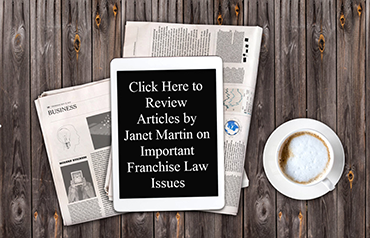Why Have Your FDD Reviewed by an Attorney
You’ve vetted the Franchisor system and concept, met the managers, visited the corporate office, and are very excited to go forward with the franchise purchase. But, your inner rational thinking comes out and you decide just before signing to hire an attorney “just in case” -basically to know you did everything correct in your due diligence. So you contact a few attorneys for a Franchise Disclosure Document or FDD Review, and basically engage the first one who gets back to you, because you want to sign the Franchise Agreement yesterday.
First-Not All Attorney FDD Reviews Are Alike, and it’s not just price that differentiates these reviews. When I am contacted I tell prospective franchisees exactly what I do and why and how my review is different than other attorneys; I basically acknowledge they can definitely get a “legal review” for cheaper, and for more, but here is what I say: What makes my review different than any other franchise attorney is my predominant focus is on the disclosure items, the audited financials and the exhibits, with minimal focus on the actual Franchise Agreement, WHY? Because you do not need a reiteration of what’s in the Franchise Agreement; you need to know what’s NOT in the Franchise Agreement-and the only place to get that kind of information is from the Disclosure Items 1-22, the Audited Financials, and the Exhibits. You see, Item 1-22 are required items of disclosure containing everything the franchisor RESERVES THE RIGHT TO DO IN THE FUTURE, including price changes, system changes, territory changes, competition changes, equipment changes, advertising requirement changes, etc., etc.-all the things that describe what the FRANCHISOR MIGHT DO IN THE FUTURE, and they will, and it may start the day after you sign the Franchise Agreement you so heavily relied on in determining your operational costs. My report points out the most alarming provisions, and the most concerning items which, in my 30 years of experience, I have found create the most problems for franchisees.
Next, I pay a lot of attention to both the Item 1 (Franchisor, affiliates, and predecessors), and Item 2 (Officers and Directors, Trainers and Salespeople). These two items alone tell me a lot about whether there are too many affiliates the officers are in identical positions on, spreading their time too thin with no real dedicated personnel for your concept. I also spend a lot of time with the Audited Financials even though it is a point in time, there are trends and transactions I evaluate to get a good picture of the strength of the Franchisor, particularly if this is a relatively new franchisor, with little resources.
Next, I evaluate the concept for competition and difficulty in finding locations, if applicable.
Next I always check the State Registration to verify that that the Franchisor is properly registered to sell franchises, and gave you the correct FDD version (you would be surprised how often Franchisors mess this up). I will also determine if the FDD appears to be deficient in areas, even though it is registered.
Last, I will always recommend certain items you should try to negotiate with the Franchisor. While most Franchisors will not negotiate because they have to comply with the Negotiates Sales requirements, some do-it doesn’t hurt to ask. Always ask!
Finally, I will point out some differences in state laws if the Franchisor is outside of California and you are in California-there are many differences that CA laws will override what’s in the Franchise Agreement.
All in all, my clients will receive a very PRAGMATIC AND PRACTICAL confidential legal review and report. And above all, you will receive well more and different information, knowledge and wisdom, than you have before coming to me so you can actually make an informed decision about this big investment. Don’t skip this stage! Trying to save a small amount of legal fees now will most certainly cost you many thousands in the future with unknown obligations you would not have signed onto had you realized, or potential litigation over unknown issues.


